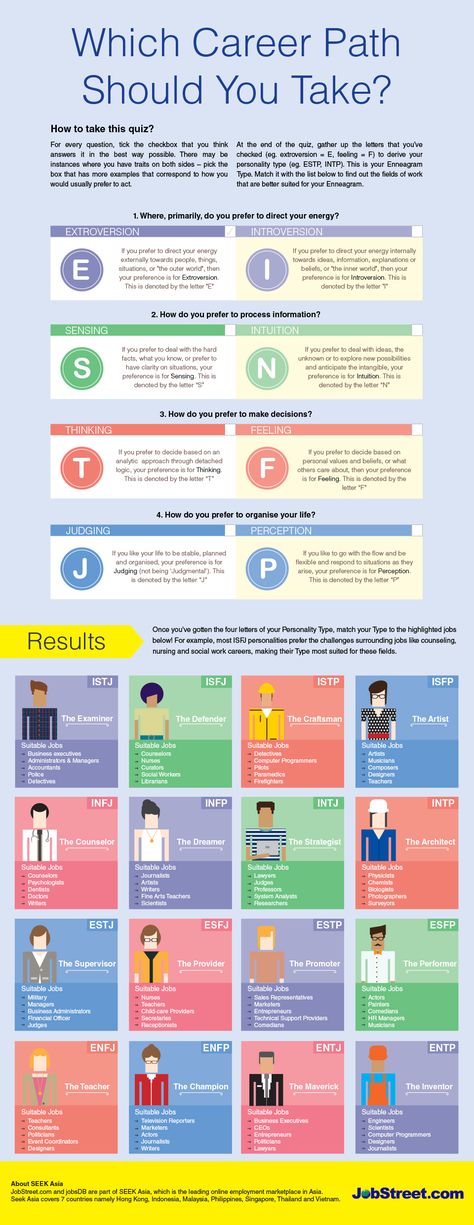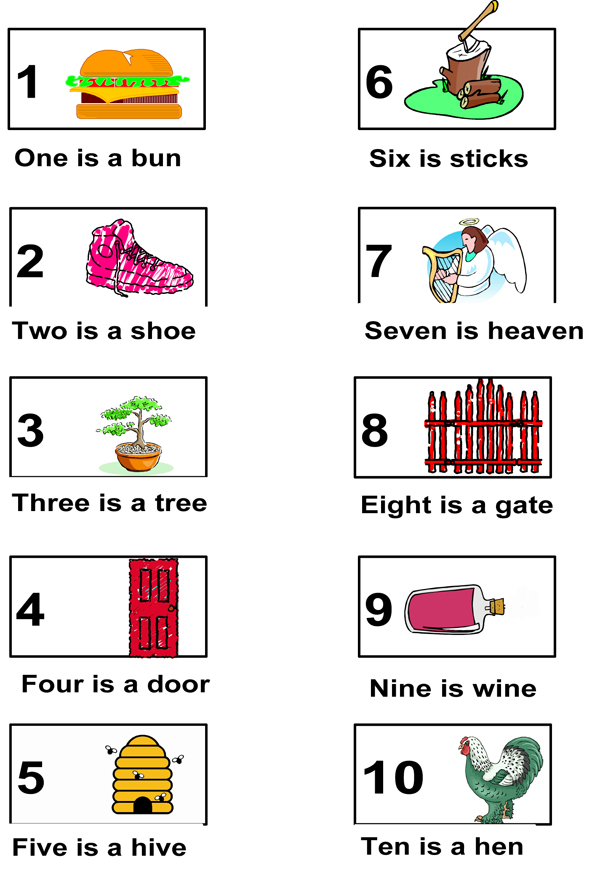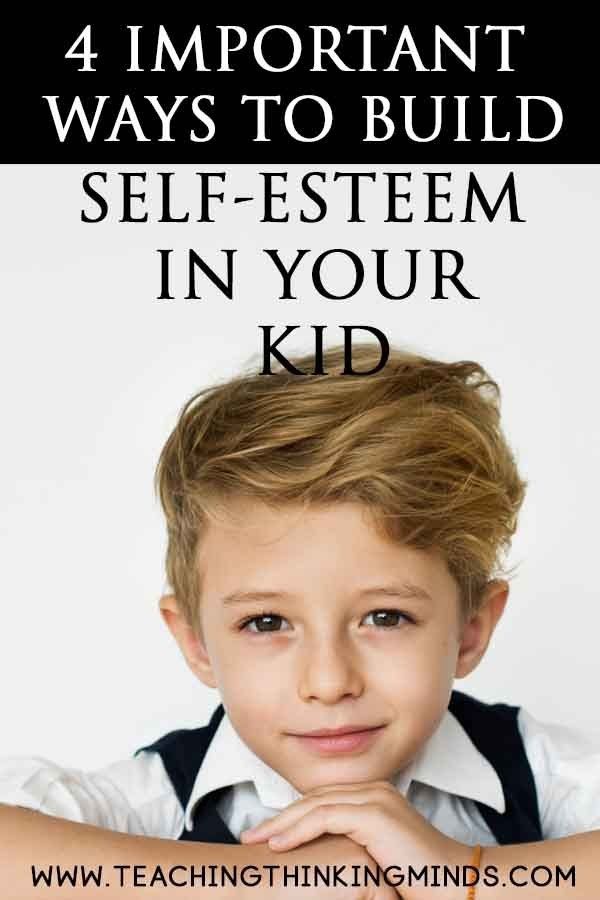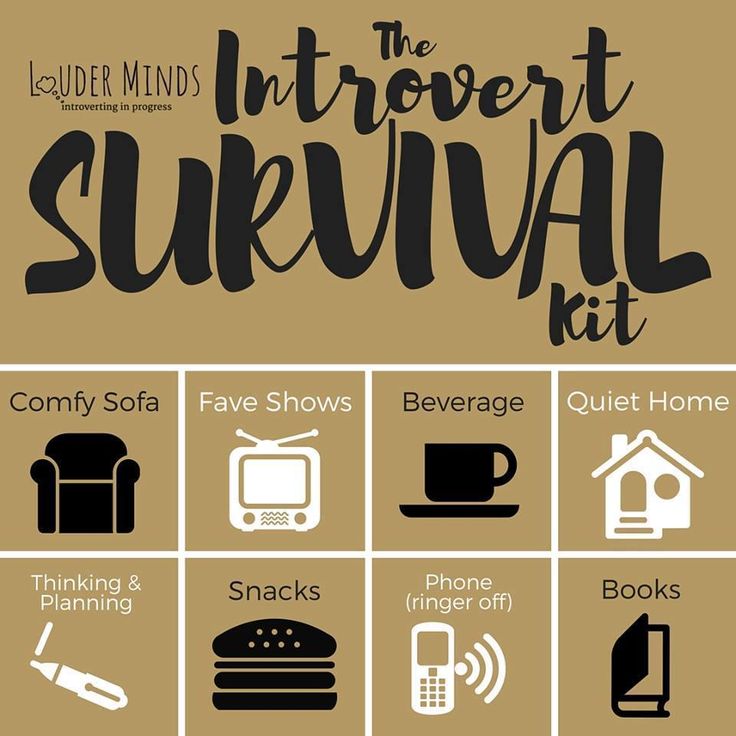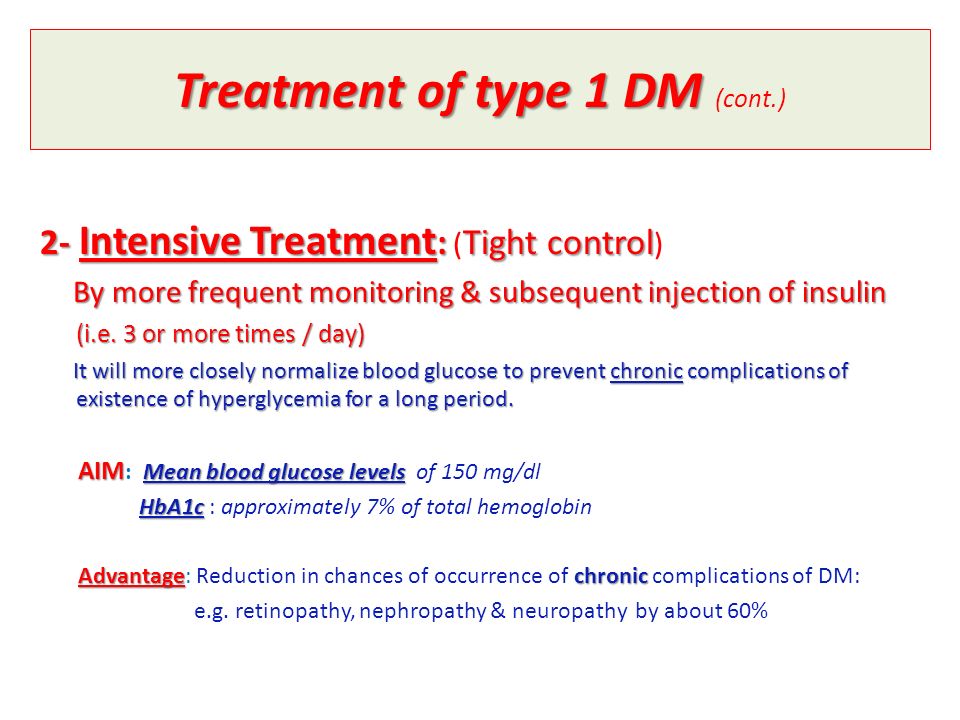Teenage parents advice
Teen parents: benefits, challenges & tips
Being a teenage parentWhat matters most to children is what their parents do, not what age their parents are. When parents raise their children in nurturing, warm, sensitive, responsive and flexible ways, children grow and develop well.
All parents navigate challenges as their children grow and develop. Many of these challenges are the same for teenage parents and older parents. But if you’re a teenage parent, you might have to navigate some special challenges, like trying to finish school while looking after a baby. You might also feel judged for being a teenage parent or overwhelmed by the responsibility of raising a child at a young age.
With the right support from family, friends and community services, you can navigate these challenges and help your children thrive by:
- working on your relationship with your baby or young child
- working on healthy relationships with other people in your life
- asking for and accepting practical and financial help
- trying to finish your education
- looking after yourself.
All pregnant women need proper and timely antenatal care. But if you’re pregnant and aged under 19 years, you need extra care in pregnancy and during parenting. You have special health concerns because your own body is still growing and developing. Pregnancy can also be a very emotional time for you. Read more about teenage pregnancy.
Your relationship with your baby as a teenage parentThe relationship you build with your child from birth and in early childhood is the foundation of your child’s health and development. A strong relationship with you helps your child feel safe and secure and gives your child confidence to learn and explore. A strong relationship also helps you understand and respond to your child’s needs.
Here are some ways you can build a strong relationship with your baby or young child:
- Bond with your baby. You can do this through cuddles, eye contact, smiles and play.
- Learn about baby behaviour and baby development.
 This can help you understand what to expect as your baby grows and develops.
This can help you understand what to expect as your baby grows and develops. - Get to know your baby’scues and body language. This can help you understand how your baby is feeling and what they need.
- Talk to your baby – the more talk, the better.
- Follow your baby’s lead about when to feed, play and sleep. This can help you develop a flexible routine for your baby.
- Play with your child. Play is a great relationship builder. It’s also the main way that children learn and develop in the early years.
As a parent, you’re always learning. It’s OK to feel confident about what you know. And it’s also OK to admit you don’t know something and ask questions or get help. And if you’re feeling overwhelmed by the demands of caring for your child, call your local Parentline. You might also like to try our ideas for dealing with anger, anxiety and stress.
Healthy relationships with others as a teenage parentRelationships during your teenage years are often full of emotional ups and downs. And if you have a baby or young child, it can put some extra pressures on relationships. For example, less sleep and less time with a partner can lead to disagreements and conflict.
And if you have a baby or young child, it can put some extra pressures on relationships. For example, less sleep and less time with a partner can lead to disagreements and conflict.
Strong and healthy relationships are not only good for you. They can influence your child’s development as well. For example, if your child sees kind and respectful relationships around them, your child learns to be kind and respectful with others.
So it’s worth working on your relationships with others when you’re a teenage parent. Here are some ideas:
- Work on positive communication with your partner if you have one. Positive communication is about listening, talking and problem-solving.
- If you have differences of opinion or disagreements, work together on conflict management.
- Make time to stay connected with friends – planning ahead and being flexible can help.
- Join a playgroup. Playgroups are great for your child’s learning and development, and they can be a great way to meet parents like yourself.
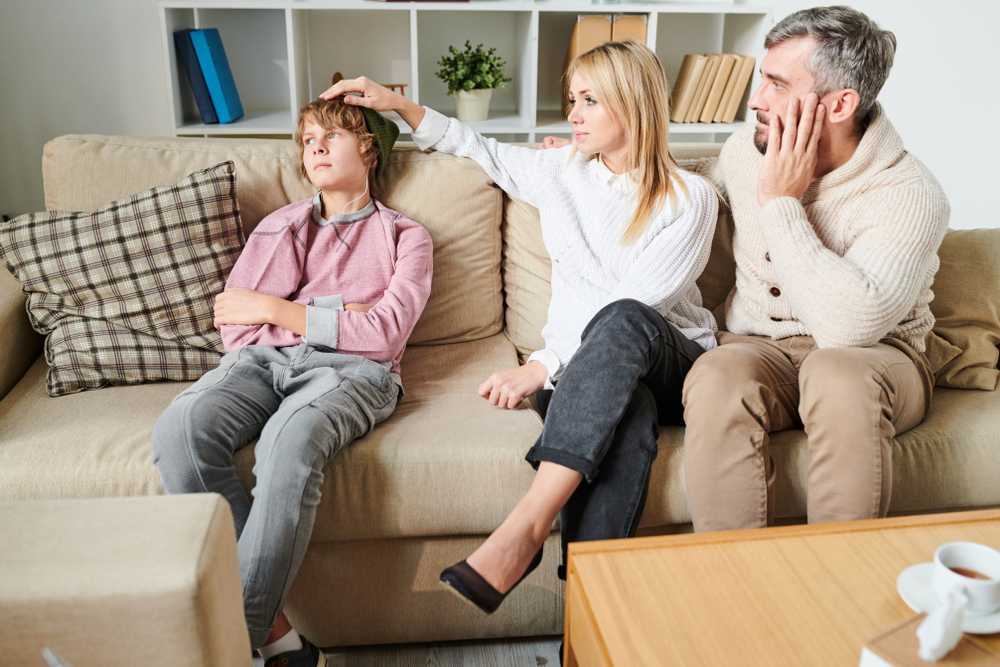 You could look for a playgroup for teenage parents.
You could look for a playgroup for teenage parents. - Contact your local community centre or local council to find out about support groups for young parents. These sorts of groups can provide emotional support as well as information on child development and health care.
If there are problems in your relationships, including family violence, you can get support by calling the National Sexual Assault, Domestic Family Violence Counselling Service on 1800RESPECT (1800 737 732). You can also call Relationships Australia in your state or territory on 1300 364 277 or Lifeline on 131 114.
Finishing school as a teenage parent
Finishing school is one of the most important things you can do, for yourself and for your child. If you finish school, you have a better chance of getting a job later on and being able to support your family. Studying can also help you stay connected with friends and other people who can support you, like teachers and school counsellors.
In Australia, if you’re pregnant or have a baby while you’re still at school, you have the right to continue and finish your schooling. And with the right planning and support, you can do it. It’s a good idea to talk to a social worker or counsellor or your antenatal team to find out about your options.
School support options might include:
- modified or flexible school hours
- reduced study load
- classroom support staff or guidance officers
- study from home
- return to school after your baby is born to complete your year 12 certificate
- part-time study to complete your year 12 certificate
- study at an external accredited institution like TAFE to complete your year 12 certificate.
You could also look at options for balancing family and study. For example, you could look into different child care options. Or you might be able to study at night while your partner or a friend or parent cares for your child.
I coped because I had to. I didn’t have much help except from friends, but I didn’t find parenting as difficult as some people made it out to be. The hardest part was dealing with so many different bits of expert advice from books, other parents and so on. Everyone has a different view on how children should be raised and I learned that you can’t panic – you just have to trust your instincts in the end.
– Pippa, mother of one
Practical help for teenage parents
There’s a lot of practical things to learn when you have a baby, like how to:
- feed your baby
- change a nappy
- bath your baby
- settle your baby for sleep
- know when your baby is sick
- start your baby on solids.
There are many people who can help you learn, including your GP, child and family health nurse, and other early childhood experts.
Money might be an issue for you as a teenage parent. It’s worth looking into government parenting payments, which can help you with the costs of raising children.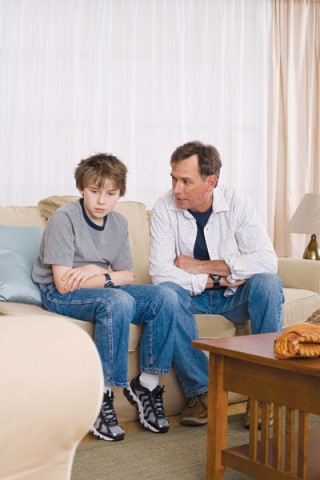
One way to ease practical and financial pressure is to think about whether you can stay with your parents while your child is young. This might help you deal with the pressures of caring for your child or coping financially. Your parents might also be able to give you some backup when you need it and even share some tips from when you were a baby.
Looking after yourselfYou’re the most important part of your baby’s life.
When you’re focusing on looking after your baby, you might forget or run out of time to look after yourself. But looking after yourself physically, mentally and emotionally will help your child grow and thrive.
The keys to looking after yourself physically are regular exercise and healthy eating and getting as much rest as you can.
Your emotional and mental health is very important too. You could see whether your local council or medical centre can put you in touch with a counselling service. Counselling can help parents with personal issues as well as issues associated with being a parent at a young age.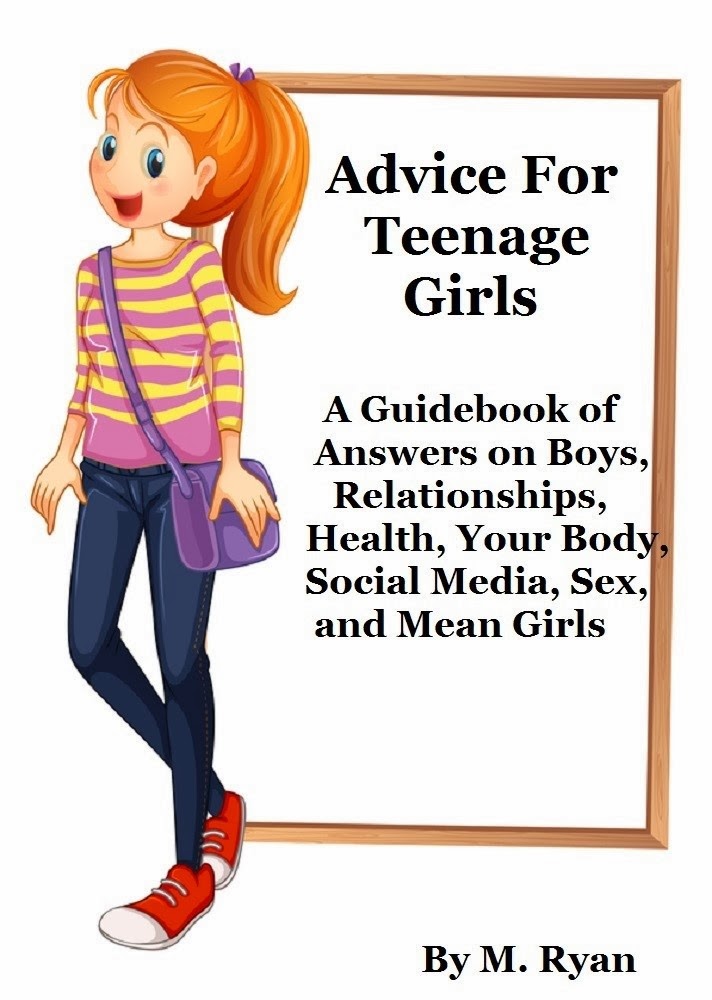
What you eat, drink or smoke is passed through your breastmilk to your baby and can affect your baby’s health and development. So if you’re breastfeeding it’s best not to drink alcohol, smoke or use drugs, including marijuana. Second-hand and third-hand smoke is especially dangerous for babies.
At the end of the day, we have a very special relationship. We’re very close and have excellent communication, and Bessie understands that she can talk to me about anything. My relationship with my parents has also improved a lot and they now play an active role in her life, which makes me just so happy.
– Pippa, mother of one
12 Tips for Peaceful Parenting Your Teen!
You may not feel like you have much influence on your child these days, but teens’ behavior is highly correlated with the strength of their bonds with their parents.
Good relationships between teenagers and their parents, as rated by both, are positively correlated with school success and general happiness as rated by the teen, and also by those around her.
By contrast, weak or conflictual parent/teen relationships are correlated with early sexual activity, experimentation with drugs and alcohol, the teen's involvement in violence (as either perpetrator or victim), and suicide.
How do you parent this blossoming person who sometimes seems to be becoming a stranger?
1. Remember you're a parent, AND a friend.
Teens crave the security of knowing their parents understand them, appreciate them, and love them no matter what--so they do want the relationship to be a form of friendship. But they also need to feel like they have some independence, so sometimes you may feel a bit shut out. If you can navigate your closeness in an accepting way that doesn't take advantage of your role as parent to tell your child what to do, he's more likely to open up and share with you.
Does a close friendship erode your teen's respect for you? No. Don't you respect your friends, and treasure those who are really there for you emotionally? If you offer your teen respect, consideration, and authenticity, that's what you'll receive in return.
And as close as you want to be to your teen, sometimes you will have to pull rank and say No. If you're doing it often, that's a red flag that something is wrong. But sometimes your teen will be looking to you to set limits they can't set for themselves. Sometimes you'll need to stick by your values and say no, whether that's to an unsupervised party or a very late bedtime. And, of course, sometimes your teen will be able to use your guidance to come up with a win-win solution that answers your concerns.
2. Establish dependable together time.
Be sure to check in every single day. A few minutes of conversation while you're cleaning up after dinner or right before bedtime can keep you tuned in and establish open communication. Even teens who seem to have forgotten who their parents are the other 23 hours a day often respond well to a goodnight hug and check-in chat once they're lounging in bed. In addition to these short daily check-ins, establish a regular weekly routine for doing something special with your teen, even if it's just going out for ice cream or a walk together.
3. Parent actively and appropriately.
Don’t invite rebellion by refusing to acknowledge that your son or daughter is growing up and needs more freedom. But don’t be afraid to ask where your kids are going, who they’ll be with and what they’ll be doing. Get to know your kids’ friends and their parents so you’re familiar with their activities.
4. Try to be there after school.
The biggest danger zone for drug use and sex isn't Saturday night; it's between 3 and 6 PM on weekdays. Arrange flex time at work if you can. If your child will be with friends, make sure there’s adult supervision, not just an older sibling.
5. Keep your standards high.
Your teen wants to be his or her best self. Our job as parents is to support our teens in doing that. But don't expect your child to achieve goals you decide for her; she needs to begin charting her own goals now, with the support of a parent who adores her just as she is and believes that she can do anything she aims to. Support your teen's passions and explorations as she finds her unique voice.
Support your teen's passions and explorations as she finds her unique voice.
6. Make it a high priority to eat meals together
...as often as you can. Meals are a great opportunity to talk about the days' events, to unwind, reinforce and bond. They're also your best opportunity to keep in touch with your teen's life and challenges, and to spot brewing problems. Finally, an important factor in kids' happiness and overall success is whether they feel they get time to "just hang out and talk" with parents every day. Click here for more on Dinner.
7. Keep the lines of communication humming.
If you don't know what's going on, you lose all hope of influencing the outcome. Click here for more on Becoming a Brilliant Listener, Getting Your Kids to Talk with You, and Family Conversations your Teen Will Love.
8. Encourage good self-care
...such as the nine and half hours of sleep every teen needs, and a good diet. Coffee is a bad idea for early teens because it interferes with normal sleep patterns. Too much screen time, especially in the hour before bedtime, reduces melatonin production and makes it harder for kids to fall asleep at night.
Too much screen time, especially in the hour before bedtime, reduces melatonin production and makes it harder for kids to fall asleep at night.
9. Continue family meetings.
Held regularly at a mutually agreed upon time, family meetings provide a forum for discussing triumphs, grievances, sibling disagreements, schedules, any topic of concern to a family member. Ground rules help. Everyone gets a chance to talk; one person talks at a time without interruption; everyone listens, and only positive, constructive feedback is allowed. To get resistant teens to join in, combine the get-together with incentives such as post-meeting pizza or ice cream, or assign them important roles such as recording secretary or rule enforcer. Click here for more on Family Meetings.
10. Keep kids safe and connected to the family by keeping computers in your common space.
It can be hard for parents to track what teens do on line because they usually know more about the computer than we do. But research shows that he'll be less tempted to spend time doing things you'd disapprove of if the computer is in a common space, where you can walk by and glance at what he's doing. Kids live online these days, but he can still stay connected to his family if online is in the heart of your home.
But research shows that he'll be less tempted to spend time doing things you'd disapprove of if the computer is in a common space, where you can walk by and glance at what he's doing. Kids live online these days, but he can still stay connected to his family if online is in the heart of your home.
11. Don't push your teen into independence before he's ready.
Every teen has his own timetable for blossoming into an independent person. Real independence includes close relationships with others, and it never needs to include rebelliousness. It is NOT healthy for your child to feel that you're pushing him into independence -- that only leads to him becoming overly dependent on the peer group for validation. If he isn't ready to go to sleep away camp for a month, then he isn't ready. Sooner or later, he will be. Respect his timetable.
12. Make agreements and teach your child to make repairs.
If you've raised your child without punishment, he will almost certainly be close to you.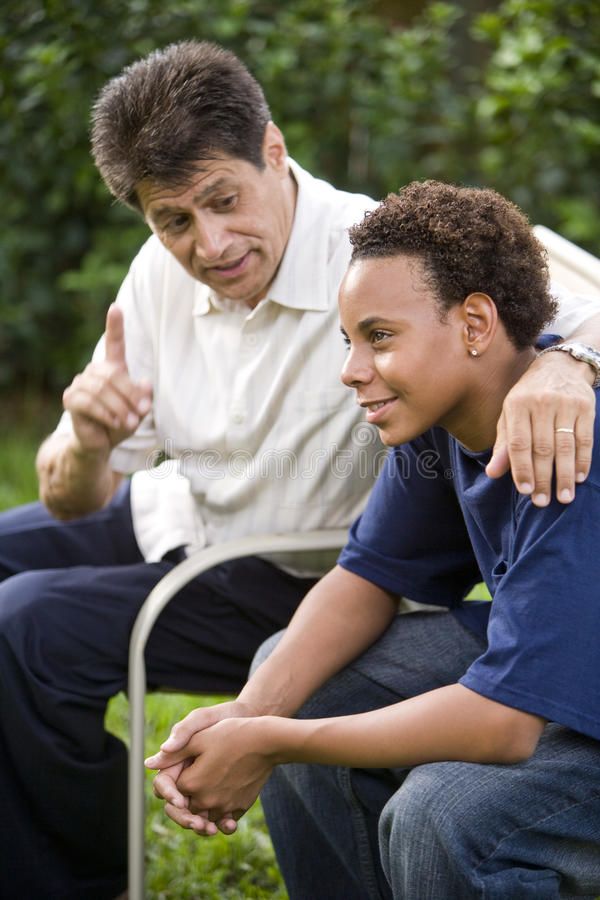 Because he doesn't want to damage the trust between you, he won't lie to you, and he won't usually infringe on your limits. If he does, ask him how he can make repairs, including repairing your trust.
Because he doesn't want to damage the trust between you, he won't lie to you, and he won't usually infringe on your limits. If he does, ask him how he can make repairs, including repairing your trust.
13. What if you've raised your child with punishment, and now she's breaking your rules and lying to you?
It's never too late to help her learn to take responsibility, but to start, she has to value her relationship with you. That means you need to stop punishing, and start listening and connecting. You also need to insist that she find ways to make repairs. That's a tricky dance, because punishment will make things worse, so she has to choose the repair-- and yet you are still insisting that she do so. No, it's not a punishment -- it's a way for her to make things better when she messes up, which is what all adults need to learn to do. But she'll only understand it this way if she wants to please you, so if you need to go to counseling together to create that relationship, don't hesitate.
14. Stay connected even as she moves into the world.
If we've accepted our child's dependency needs AND affirmed her development into her own separate person, she'll stay fiercely connected to us even as her focus shifts to peers, high school and the passions that make her soul sing.
It's appropriate for teens to want to spend more time with their peers than their parents as they get older, but kids who are well grounded in their families will respond well to parents' efforts to stay connected. And parents who have bonded adequately with their children at each earlier stage will feel invested enough in their teens to stay connected, even if a lot of effort is required.
It’s critical, during the teen years, for parents to remain their children’s emotional and moral compass. Kids will begin to experiment with intimate relationships outside the family, but to do that successfully, they still rely on those intimate relationships at home remaining solid. That means that a 14 year old who focuses mostly outwards is probably looking for something he wasn’t getting at home.
That means that a 14 year old who focuses mostly outwards is probably looking for something he wasn’t getting at home.
We need to invite our children to rely on us emotionally until they’re emotionally ready to depend on themselves. Too often, in our culture, we let teenagers transfer their dependency outside the family, with disastrous results. Teens often give up a great deal of themselves in pursuit of the closeness they crave, only to crash against the hard reality that other teens aren’t developmentally able to offer them what they need to flourish as independent young adults.
You may not be at the top of your teen's list nowadays, but work like the dickens to stay close, and don't take it for granted that your child will now push you away. That’s a sign of a damaged relationship. Don't give up. It’s never too late in your relationship with your child to do repair work and move closer.
PSYCHOLOGIST'S TIPS TO PARENTS OF TEENAGERS | The official site of the Kabardino-Balkarian State University.
 HM. BerbekovaOfficial site of the Kabardino-Balkarian State University named after I.I. HM. Berbekova
HM. BerbekovaOfficial site of the Kabardino-Balkarian State University named after I.I. HM. Berbekova PSYCHOLOGIST'S ADVICE TO PARENTS OF TEENAGERS
- Interest and help. Parental support generates a trusting relationship between children and parents and entails high self-esteem of adolescents, contributes to academic success and moral development. Insufficient parental support, on the contrary, can lead to a child's low self-esteem, poor learning, impulsive actions, poor social adaptation, unstable and antisocial behavior.
- The ability of parents to listen, understand and empathize. The inability of parents to empathize (empathy), their lack of emotional susceptibility and understanding of the thoughts and feelings of the child can lead to the development of indifference in the child. Respect for a teenager, communication of parents with him contribute to the establishment of harmonious relations in the family.
- Love of parents and positive emotions in family relationships are associated with intimacy, affection, love, receptivity; family members at the same time show mutual interest and responsiveness.
 If negative emotions prevail in the family, then coldness, hostility, rejection are observed, which can lead either to the predominance of the child's need for love (in adulthood), or to the formation of isolation, coldness, inability to express his love to loved ones, including to children.
If negative emotions prevail in the family, then coldness, hostility, rejection are observed, which can lead either to the predominance of the child's need for love (in adulthood), or to the formation of isolation, coldness, inability to express his love to loved ones, including to children. - Parental recognition and approval.
- Trust in the child. Distrust of children, as a rule, indicates that parents are projecting their own fears, anxieties or feelings of guilt onto them. Insecure parents (or those who have experienced certain difficulties in the past) are more likely to fear for their children than others.
- Treating a child as an independent and adult person. The achievement of independence by a teenager occurs in the process of individualization, when he is engaged in the formation of his own individuality and at the same time establishes new ties with his parents. The teenager is trying to change the relationship with his parents, while trying to maintain the same communication, affection and trust.
 In order to show their own individuality, adolescents are guided by a system of values that is different from that of their parents, they set themselves other goals, other interests and other points of view.
In order to show their own individuality, adolescents are guided by a system of values that is different from that of their parents, they set themselves other goals, other interests and other points of view. - Parental guidance. The most functional are those families where parents show flexibility, adaptability and tolerance in their views and behavior. Parents who are inflexible in raising teenagers refuse to reconsider their views and change their point of view; they are intolerant, overly demanding, always critical and place unjustified hopes on children that do not correspond to their age. This adversely affects the self-esteem of a teenager, suppresses the development of his personality, which ultimately leads to stressful situations in the relationship between parents and children.
- Parental example: ability to set a good role model; follow the same principles taught to children. Since the process of identification in adolescents partly takes place in the family, those of them who are proud of their parents, as a rule, feel quite comfortable in the world around them.

- Cooperation with the college. If something worries you in the behavior of the child, try to meet as soon as possible and discuss it with the class teacher, teacher-psychologist, head of the educational department, deputy director for educational work.
- Ask who your child is talking to.
Remember: the main helpers of parents in difficult situations are patience, attention and understanding.
Speaking with a teenager in an adult language
Parents often face the problem that in adolescence, children become more withdrawn, uncontrollable and deliberately contradict adults. Often this arises from the fact that parents are too worried about their children: for their safety, or, for example, academic performance. But children have already grown up and are learning to take responsibility for their decisions.
Teenagers would like to ask their parents for advice on how best to implement their own ideas and decisions.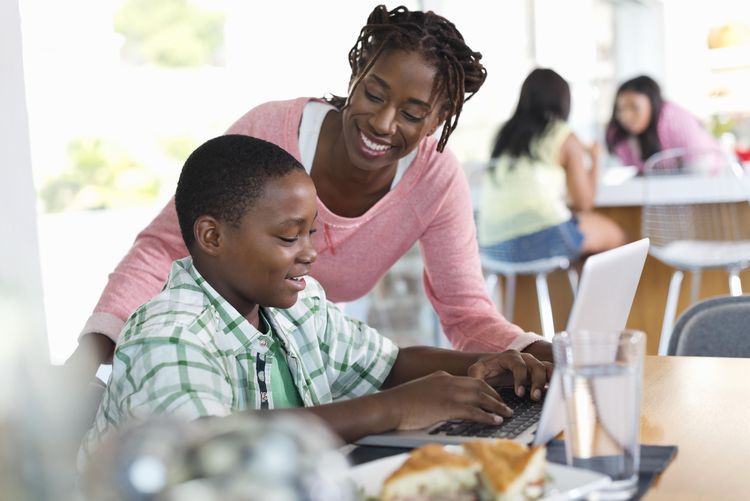 They want to communicate with their parents "on an equal footing." But often parents, worrying about their children, try to control all the actions of teenagers. Children, counting on the help of their parents, face many prohibitions and perceive this as distrust. Therefore, it is necessary and very important to find the strength in yourself to admit that your teenager has already grown up and is worthy of talking to you in an “adult language”.
They want to communicate with their parents "on an equal footing." But often parents, worrying about their children, try to control all the actions of teenagers. Children, counting on the help of their parents, face many prohibitions and perceive this as distrust. Therefore, it is necessary and very important to find the strength in yourself to admit that your teenager has already grown up and is worthy of talking to you in an “adult language”.
Recommendations for parents
Of course, everything depends on the specific situation and the method of influencing a teenager must be selected individually. We offer several options:
- Create a non-standard situation when a teenager expects resistance, distrust from your side, and in return receives sincerity and help in resolving his issues.
- Support one of the teenager's hobbies, show interest in hobbies and hobbies.
- Establish a family tradition when a family gathers together in the evening and shares the events that happened to each of them during the day.

Psychologist's advice to parents of teenagers
- Appreciate the frankness of your children, be sincerely interested in their problems.
- Communicate as equals, the tone of the order will not work in your favor. Let them know that you understand them.
- You can not make fun of them, ridicule feelings, belittling their significance. Try to treat your children with respect, remember their vulnerability and vulnerability.
- Do not get irritated or aggressive, be calm and restrained. Remember that your rudeness will cause them to respond.
- Do not talk about the object of your child's passion in a dismissive, insulting tone, thereby you will humiliate him.
- In no case should one rudely and categorically break off relations between teenagers, because they are just learning to communicate with each other and most often they don’t even think about anything bad.
- Invite his (her) girlfriend (friend) to your place, get to know - this will allow you to get an objective, more believable, and not unfounded idea of who your child is dating.
 It is better if you allow them to meet at your home so that they do not have to look for random and questionable places to meet.
It is better if you allow them to meet at your home so that they do not have to look for random and questionable places to meet. - Tell them about yourself, your first love story - this will help you find mutual understanding with your child.
- If you manage to establish friendly relations with him, you will have the opportunity not only to control his behavior, but also to influence his actions.
- Remember that, on the one hand, a teenager is in dire need of parents' help, facing many problems, and on the other hand, he seeks to protect his inner world of intimate experiences from unceremonious and rude intrusion, and he has every right to do so.
Tips for parents
- Agree with anxiety and displeasure. This is an age full of contradictions and anxiety. There is nothing abnormal in the fact that a teenager's behavior is changeable and unpredictable, that he rushes from one extreme to another, loves his parents and hates them at the same time, etc.

- Avoid trying to appear too understanding. Avoid statements such as "I totally understand how you feel." Teenagers are sure that they are unique, unique in their own way. Their feelings are even for themselves something new, personal. They see themselves as complex and mysterious beings, and they are genuinely distressed when, in the eyes of others, their experiences look simple and naive.
- Distinguish between consent and permission, tolerance and authorization. Parents may be tolerant of undesirable actions of children (for example, a new hairstyle) - that is, actions that were not sanctioned, not encouraged by parents.
- Talk and act like an adult. Don't compete with your teenager by behaving like him, using youth jargon. Adolescents deliberately adopt a lifestyle that is different from that of their parents, and this is also part of the process of forming their personality. Thus begins their departure from their parents.
- Approve and support your teenager's strengths.
 Limit comments related to the bad side of the teenager's character. A reminder of shortcomings can greatly slow down communication between a teenager and a parent. It is the multi-step task of the parent to create relationships and provide the adolescent with life experiences that will build character and personality.
Limit comments related to the bad side of the teenager's character. A reminder of shortcomings can greatly slow down communication between a teenager and a parent. It is the multi-step task of the parent to create relationships and provide the adolescent with life experiences that will build character and personality. - Avoid highlighting weaknesses. When other weaknesses of character are discovered, the teenager feels pain. And if the cause of this pain is the parents, then it does not go away longer.
- Help your teenager think for himself. Don't increase dependence on you. Speak in a language that will help develop independence: "It's your choice," "You decide for yourself," "You can be responsible for it," "It's your decision." Parents should lead their children to independent decision-making and teach them to doubt the correctness of the opinions of their peers.
- Truth and compassion give birth to love. Do not rush to clarify those facts that, in your opinion, have been perverted.
 Parents who are quick to punish will not teach you to respect the truth. Some parents are too quick to report exactly where, when, and why they were right. Often teenagers meet such statements with stubbornness and anger. Thus, sometimes the truth turns into a deadly weapon for family relationships, if the only goal is to get to the bottom of the truth.
Parents who are quick to punish will not teach you to respect the truth. Some parents are too quick to report exactly where, when, and why they were right. Often teenagers meet such statements with stubbornness and anger. Thus, sometimes the truth turns into a deadly weapon for family relationships, if the only goal is to get to the bottom of the truth. - Respect the need for privacy. This principle requires some distance, which may seem impossible to some parents.
- Avoid loud phrases and sermons. Try talking instead of lecturing. Avoid statements like “When I was your age…”, “This hurts me more than you…”.
- Do not label. “You are stupid and lazy. You will never achieve anything." Such "hanging" leads to the fact that the prediction is fulfilled, of course. After all, children tend to conform to what their parents think of them.
- Avoid ambiguous statements. A parent's appeal to a teenager should contain one piece of information: an understandable prohibition, benevolent permission, or an open opportunity to make a choice.

- Avoid extremes: giving complete freedom is just as wrong as "tightening the screws".
- Keep a sense of humor.
Parents of teenagers should know that…
Teenagers are characterized by the following characterological reactions:
- The reaction of emancipation is manifested in the desire to free oneself from the guardianship and control of elders. It can be expressed in a persistent desire to always and everywhere act "in one's own way", in violation of the orders and rules established by the elders. This reaction can be aggravated by overprotection by elders, petty control, deprivation of minimal independence and freedom.
- The reaction of the opposition can be caused by excessive claims to the child, an unbearable burden for him - the requirement to be an excellent student in school, to excel in language, music, etc. But more often this reaction is the result of a loss or a sharp decrease in the usual attention from relatives.
 The manifestation of the reaction of the opposition in adolescents is very diverse - from skipping classes and running away from home to suicide attempts, most often demonstrative.
The manifestation of the reaction of the opposition in adolescents is very diverse - from skipping classes and running away from home to suicide attempts, most often demonstrative.
For this purpose, deliberate flaunting of alcoholism or drug use can be used. All these demonstrations seem to say: "Pay attention to me - otherwise I will be lost!"
- The reaction of compensation is the desire to make up for one's weakness and failure in one area with success in another. A sickly, physically weak boy compensates for his weakness with excellent academic success, allowing him to gain authority among his peers. Conversely, difficulties in learning can be compensated for by “bold” behavior, leadership in behavioral violations, in the worst case, participation in asocial companies, committing offenses.
- Hyper compensation reaction. Here, they persistently and persistently achieve high results precisely in the area where they are weak. It is precisely because of hypercompensation that shy and timid teenagers, when choosing sports, prefer brute force - boxing, sambo, and a teenager who suffered from stuttering enthusiastically devotes himself to artistic reading and performs at amateur concerts.

- Grouping reaction with peers. Adolescents have an urgent need for their own identity and belonging to a group. Adolescents do not yet have a clearly conscious "I-image" and often feel more secure in an environment of their own kind. The feeling of "I" is still difficult to isolate from "We" - adolescents become members of various informal organizations. The group for a teenager becomes the main regulator of behavior.
This may explain the well-known fact that the vast majority of delinquency among adolescents is committed in a group. A pattern is observed: the younger the teenager, the larger the composition of the group. As they grow older, the number of group members decreases. At the age of 16-18, the group consists of 2-3 people.
10 tips for parents of teenagers
1. During adolescence, children begin to evaluate the life of their parents. Adolescents, especially girls, discuss the behavior, actions, appearance of mothers and fathers, teachers, acquaintances. And they constantly compare. At some point, the result of this comparison will affect your relationship with your son or daughter. It can be both pleasant and unpleasant for you. So, if you don't want to lose face, start preparing for this assessment as early as possible.
And they constantly compare. At some point, the result of this comparison will affect your relationship with your son or daughter. It can be both pleasant and unpleasant for you. So, if you don't want to lose face, start preparing for this assessment as early as possible.
2. The most important thing in your relationship with your child is mutual understanding. To install it, you must be proactive and not hold grudges. One should not both follow the momentary desires of the child, and always oppose them. But if you cannot or do not consider it necessary to fulfill the desire of your son or daughter, you need to explain why. And in general, talk more with your children, talk about your work, discuss with them their affairs, toys or educational, know their interests and concerns, friends and teachers. Children should feel that you love them, that in any situation they can count on your advice and help and not be afraid of ridicule or neglect.
Support children's confidence in themselves, in their abilities, in the fact that even with certain shortcomings (which everyone has), they have their undeniable advantages. The strategy of parents is to form a position of confidence in the child: “everything depends on me, I am the reason for failures or successes. I can achieve a lot and change everything if I change myself.”
The strategy of parents is to form a position of confidence in the child: “everything depends on me, I am the reason for failures or successes. I can achieve a lot and change everything if I change myself.”
In the educational process, confrontation, the struggle of the educator with the pupil, the opposition of forces and positions is unacceptable. Only cooperation, patience and interested participation of the educator in the fate of the pupil give positive results.
3. Surprise - you will remember! The one who makes an unexpected and strong impression becomes interesting and authoritative. What attracts a child in an adult? Strength, but not violence. Knowledge - remember, for example, the eternal "why?" at babies. To what proportion of them did you manage to answer clearly and completely? Mind - it is in adolescence that it becomes possible to appreciate it. Skills - dad knows how to ski, fix a TV, drive a car ... And mom draws, cooks delicious pies, tells fairy tales .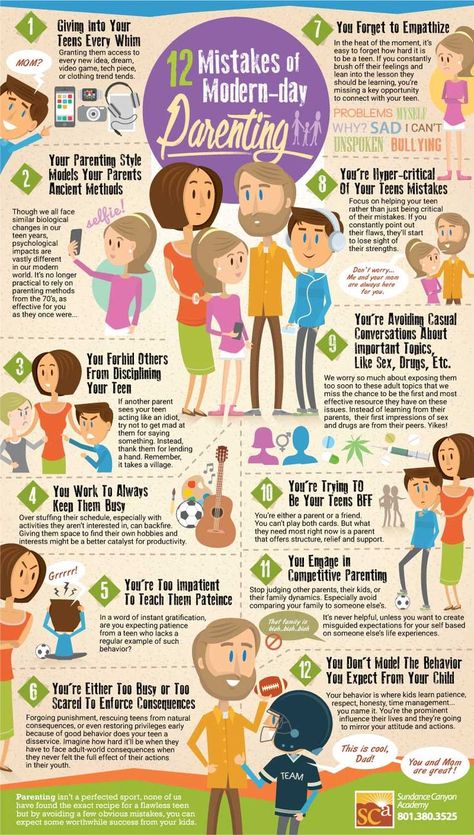 .. Appearance - girls appreciate it more. The life of parents, their habits, views have a much greater influence on the child than long moralizing conversations. Your income is also important for teenagers. If you're competitive in this area, think ahead about what you can put on the other side of the scale when your older child confronts you with this problem.
.. Appearance - girls appreciate it more. The life of parents, their habits, views have a much greater influence on the child than long moralizing conversations. Your income is also important for teenagers. If you're competitive in this area, think ahead about what you can put on the other side of the scale when your older child confronts you with this problem.
4. Do you want your child to be strong and healthy? Then learn for yourself and teach him the basics of knowledge about your body, about ways to maintain and improve health. This does not mean at all that you have to master the doctor's arsenal and the prescription of various medicines. Medicines are only an "ambulance" in cases where the body cannot cope on its own. Even Tissot argued: "Movement as such can replace all medicines in its action, but all the medical remedies of the world are not able to replace the action of movement." The main thing is to teach the body to cope with loads, especially physical ones, because they train not only muscles, but also all vital systems. This is a considerable and regular work, but for that a “feeling of muscular joy” is given to a person, as the great doctor and teacher P.F. called this feeling almost a hundred years ago. Lesgaft. Of course, physical and any other loads should correspond to the age capabilities of the child.
This is a considerable and regular work, but for that a “feeling of muscular joy” is given to a person, as the great doctor and teacher P.F. called this feeling almost a hundred years ago. Lesgaft. Of course, physical and any other loads should correspond to the age capabilities of the child.
By the way, only physical exercises, including physical education classes, can mitigate the harm from many hours of sitting at a desk. So do not rush to release the child from physical education. This will not bring him even temporary relief in a stressful school life. Even if he has a chronic disease (and even more so!), he needs to do physical education, only according to a special program.
And it is absolutely essential that a child understands that there is no happiness without health.
5. How much time per week do you spend with your children? According to sociological surveys, most adults on average devote no more than 1.5 hours a week to children! And how to fit heart-to-heart talks, trips to the theater and nature, reading books and other common activities here? Of course, this is not the fault, but the misfortune of most parents who are forced to spend all day at work in order to fill the family budget. But children should not be left to their own devices. It is good if there are grandparents who are able to take on some of the problems of upbringing. And if they are not? Be sure to think about what your child will do during the hours free from studying and preparing lessons. Sports sections (do not forget to talk to the coach yourself) will not only take time, but will help improve your health and develop motor skills and abilities. In the house of children's creativity, you can learn how to sew, build airplanes, write poetry. Let the child have the freedom to choose an activity, but he must know for sure: he has no time for idleness and boredom.
But children should not be left to their own devices. It is good if there are grandparents who are able to take on some of the problems of upbringing. And if they are not? Be sure to think about what your child will do during the hours free from studying and preparing lessons. Sports sections (do not forget to talk to the coach yourself) will not only take time, but will help improve your health and develop motor skills and abilities. In the house of children's creativity, you can learn how to sew, build airplanes, write poetry. Let the child have the freedom to choose an activity, but he must know for sure: he has no time for idleness and boredom.
6. Take care of your child's health and your own, learn to play sports together with him, go on vacation, go hiking. What delight a child experiences from an ordinary sausage fried on a fire, from a crumbled piece of black bread, which was found in a bag after returning from the forest, where you picked mushrooms together. And a day spent in the garage with his father repairing a car will seem to the boy a holiday more important than riding in the park on the “coolest” attraction. Just do not miss the moment while the child is interested.
Just do not miss the moment while the child is interested.
The same applies to the habit of household chores. The little one is interested in washing the dishes himself, peeling potatoes, baking a pie with his mother. And this is also an opportunity to talk, tell, listen. They missed this moment - they "saved" the child so that they would not get their hands dirty, that's all - the assistant was lost forever.
7. The desire of adults to avoid talking to children about certain topics teaches them to think that these topics are forbidden. Evasive or distorted information causes unreasonable anxiety in children. And at the same time, it is not necessary to give children the information that they do not ask about, that they cannot emotionally cope with yet, that they are not ready to comprehend. The best option is to give simple and direct answers to the children's questions. So parents themselves need to develop comprehensively - not only in the field of their specialty, but also in the field of politics, art, general culture, in order to be an example of morality for children, a bearer of human dignity and values.
8. Do not unnecessarily protect teenagers from family problems, both psychological (even if there was an accident, someone's illness or death - this tempers the soul and makes it more sensitive), and material (this teaches you to find a way out). A teenager needs positive and negative emotions. For the successful development of a child, it is useful to occasionally deny him something, limit his desires, thereby preparing him to overcome similar situations in the future. It is the ability to cope with troubles that helps a teenager to form as a person. The role of an adult is primarily to help the child become an adult, that is, to teach him to confront reality, and not run away from it. Fencing off the child from the real world, even with the best of intentions, parents deprive him of the opportunity to gain life experience, to find his own way.
Never lie to a child, even if it is dictated by the best beliefs and concern for his peace and well-being. Children in some unknown way sense lies in any form.


